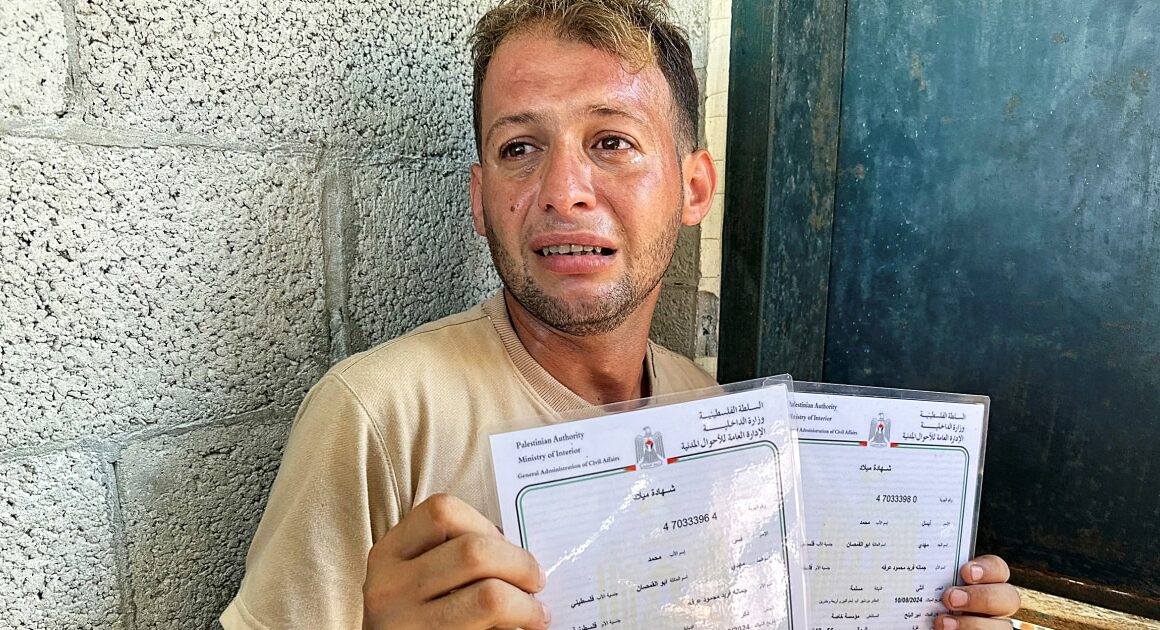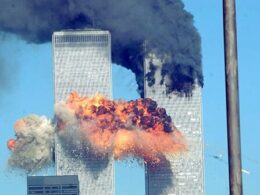It was supposed to be a joyful affirmation of new life in Gaza’s ruins.
Instead, as Mohamed Abu Al-Qomasan waited to collect the birth certificates of his days-old twins, he learned the newborns and his wife had been killed in what local officials and witnesses said was an Israeli strike.
“The pain inside me is too big for me to express,” he told NBC News’ crew on the ground in Gaza in an interview Wednesday. “I still feel like I am in a nightmare.”
Holding up the birth certificates of Ayssel and Asser with tears in his eyes, he said how he had been racing to retrieve the precious documents Tuesday when he received the gut-wrenching call.
“Someone told me, ‘the apartment you were living in was shelled,'” said Abu Al-Qomasan, speaking from Deir al-Balah, the city in central Gaza where he and his family had sought shelter in an apartment building during Israel’s monthslong military offensive in the enclave.
,
,
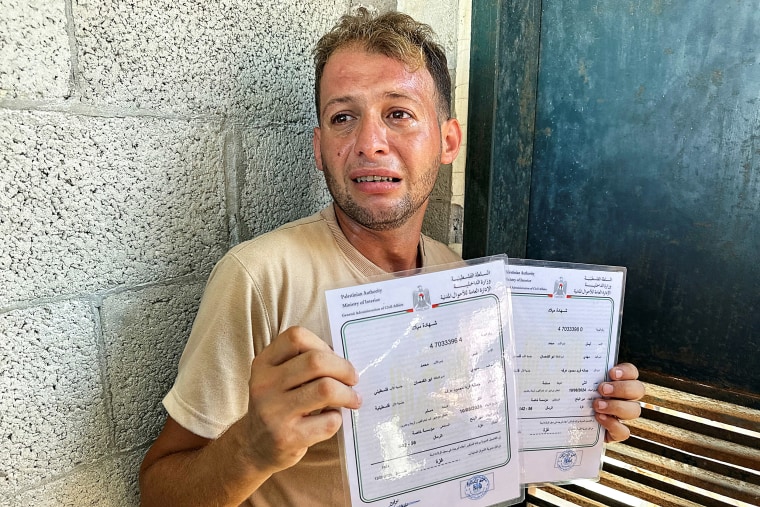
,
,
Abu Al-Qomasan said he raced to Al-Aqsa Martyrs Hospital, where he was told his loved ones had been taken, hoping to find them alive.
Instead, the worst awaited him: The children he and his wife had welcomed to the world just four days ago had been killed, along with their mother, Joumana Arafa, and the twins’ maternal grandmother.
In video shared on social media, the father can be seen wailing as he falls into the arms of a companion, still gripping the twins’ birth certificates as others gather around, trying to console him.
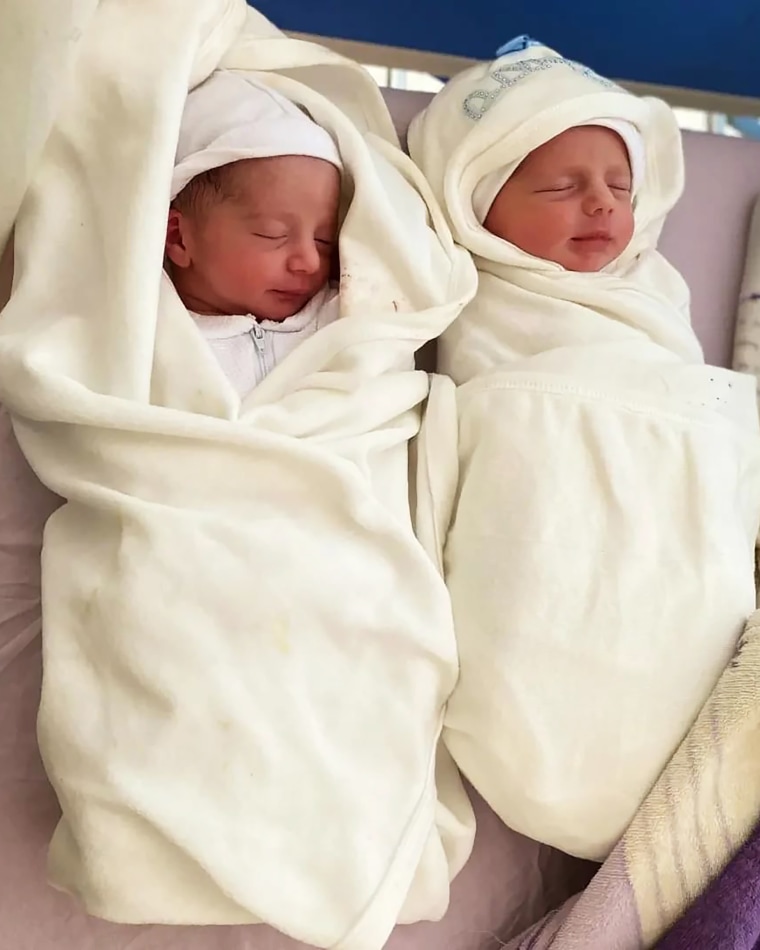
Later that day, he could be seen mourning with loved ones over the covered bodies of his family in video captured by NBC News’ crew.
“I swear they preceded you to heaven,” one man can be heard telling the grieving father. “Today we buried a woman and her husband.”
Arafa, a pharmacist, had given birth to the twins on Saturday.
Abu Al-Qomasan told NBC News that he and his wife had done everything they could to stay safe during Israel’s offensive in hopes of seeing their twins born safely.
“She was so scared, worried and wondering if the children would be fine,” he said of his wife, who he had married just over a year ago.
Abu Al-Qomasan said he had been working outside Gaza for years as an accountant before returning to the enclave for the wedding, with hopes of building a family with his wife. He said the couple had tried to flee Gaza after Israel launched its offensive, but to no avail.
After being repeatedly displaced inside the enclave, he said he and his wife had understood the area they were staying in to be part of the “safer” humanitarian zone and had even been in touch with humanitarian groups that he said had told them “not to leave this area, as it is safe.”
On a Facebook page appearing to belong to Arafa, the last post, dated Aug. 10, announces the arrival of her newborn twins with heart emojis around their names.
Since Tuesday, the post has been shared more than 21,000 times with friends of the family and social media users mourning their deaths.
The Gaza Civil Defense Agency said in a statement that Israeli shelling had hit a group of apartment buildings in the area Tuesday, while witnesses also described shelling early that morning.
The Israel Defense Forces told NBC News in a statement Wednesday that the “details of the incident as published are not currently known to the IDF.”
,
,
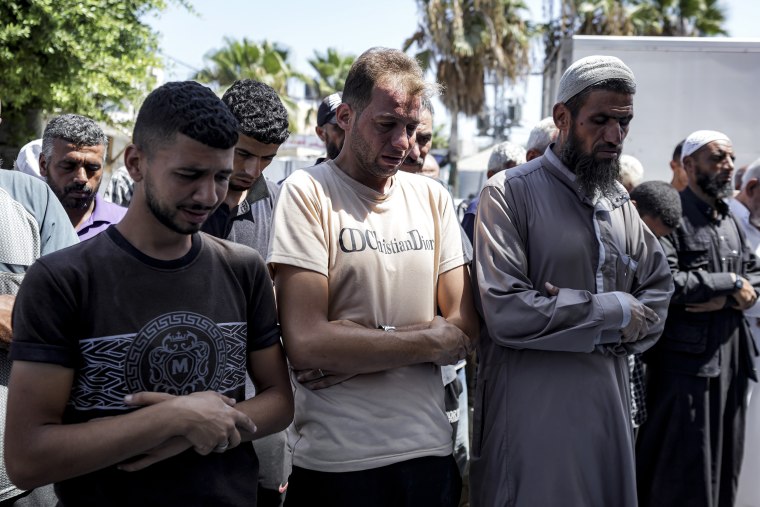
,
,
The IDF reiterated past statements that it “only military objectives and employs various measures to minimize harm to civilians.”
In a separate public statement Wednesday, the IDF said its troops continued operations in central and southern Gaza, with its aircraft striking more than 40 targets over the past day.
More than 40,000 people, including thousands of children, had been killed in Israel’s monthslong military offensive in the Gaza Strip as of Thursday, according to local health officials. The Health Ministry in Gaza has said that at least 115 newborns have been killed since the war began.
Israel has been accused in the International Court of Justice of genocidal acts in its deadly offensive, which it launched in the wake of Hamas’ Oct. 7 terror attack, in which some 1,200 people were killed and around 250 others taken hostage, marking a major escalation in a decadeslong conflict. Both Israel and the United States have rejected accusations of genocide in the Gaza offensive.
Efforts to negotiate a cease-fire deal that would bring an end to fighting in the enclave and see hostages released have so far failed to yield results, with talks set to resume in Qatar’s capital, Doha, on Thursday.
With no clear cease-fire in sight and his life shattered, Abu Al-Qomasan said he does not know what he will do now. And he noted he is far from alone.
“There are a lot of casualties who died in similar incidents,” he said.
“My children won’t be the first, but god willing, they will be the last.”
,




